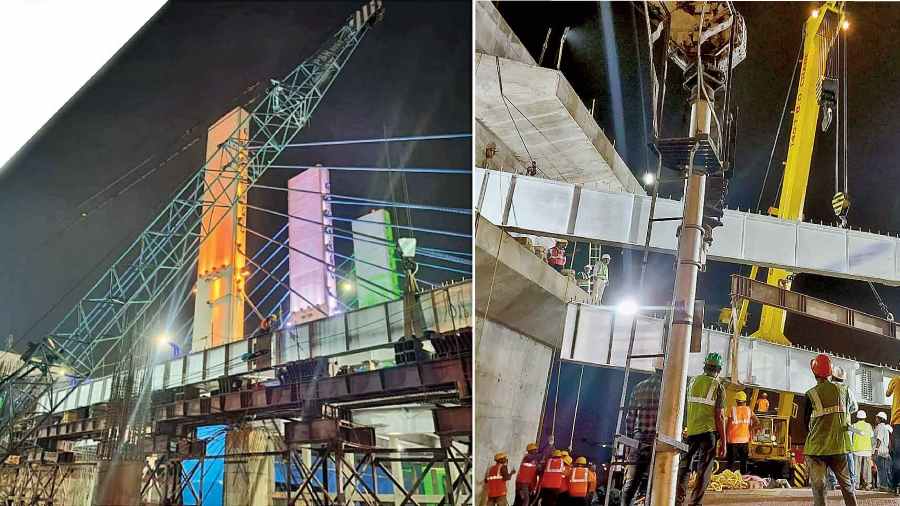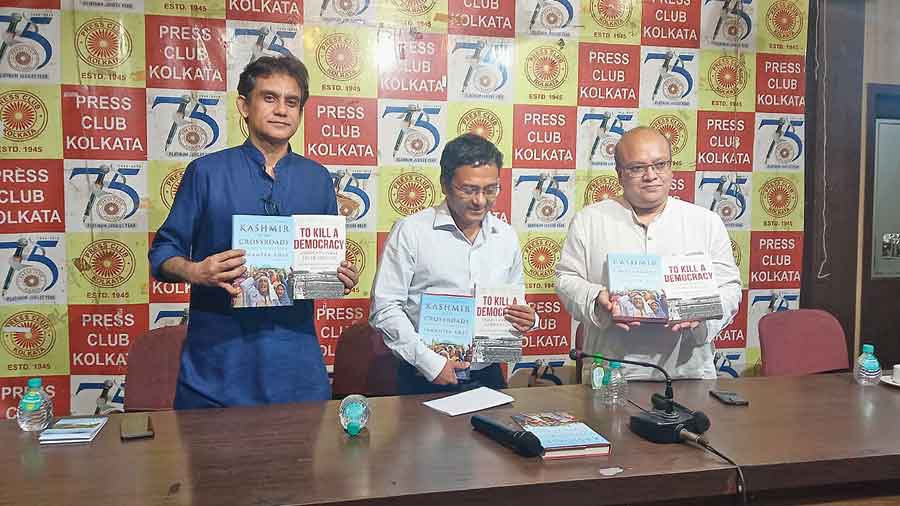Democracy is much more than just elections. Glaring social inequality and weakening of public institutions like the judiciary and news media cannot be part of a meaningful democracy.
While freedom of speech is in peril in the rest of India, it is non-existent in Kashmir.
A discussion on two books — one examines the depleting health of Indian democracy and the other is an account of the Kashmir conflict from its origins to the present volatile juncture — at Press Club in Kolkata on Saturday saw the authors share their thoughts on the state of affairs in the country.
Hong Kong-based Indian journalist Debasish Roy Chowdhury, the author of To Kill A Democracy: India’s Passage to Despotism, said the public image of a successful democracy was often erroneously linked to elections.
“Democracy derives legitimacy from social equality, strong civil rights and robust and independent public institutions. India has seen gradual weakening of institutions like the judiciary and media. Social inequality is rampant. Your votes are equal but your bodies are not. If there is no semblance of equality in society, then democracy loses its meaning. In such a scenario, elections become a farce,” said Roy Chowdhury.
Sumantra Bose, author of the other book, Kashmir at the Crossroads, said “repression of Kashmiris had reached a surreal level” since August 2019, when the Union government scrapped Jammu and Kashmir’s special status.
“Freedom of speech may be in peril in other parts of India. But in the Union Territory of Jammu and Kashmir, it is non-existent. The scrapping of the special status (of Jammu and Kashmir) might seem to have worked in the short term. There is a deafening silence in Kashmir. But sooner or later, this silence will be broken. Then, all of us will be left to face the consequences,” said Bose, a professor of international and comparative politics at the London School of Economics.
Roy Chowdhury said hunger, malnutrition and communal polarisation, along with weakening of public institutions, erode democracy and promote despotism. “In such a scenario, people lose faith in the system. People stop looking for public representatives. They start looking for a saviour,” he said.
Roy Chowdhury’s book, co-authored with Sydney University political science professor John Keane, deals with the “growing alarm” about India’s “democratic health”.
The description on Amazon website says the book “rejects the belief that India was once a beacon of democracy but is now being ruined by the destructive forces of Modi-style populism. The book details the much deeper historical roots of the present-day assaults on civil liberties and democratic institutions”.
The Indian edition of the book was supposed to have been published by Oxford University Press in July last year.
But OUP India first delayed and then decided not to print the book, returning the publishing rights to the authors.
Before the alleged U-turn by the publisher, the book and Roy Chowdhury had been criticised by the Organiser magazine — that usually echoes the views of the Sangh — for articles he wrote in the Time magazine criticising the Narendra Modi government’s handling of the pandemic.
A spokesperson for OUP India had said the “sales team felt the content is provocative” but categorically denied that the article in the Organiser had anything to do with the delay.
The authors eventually found a publisher for the Indian edition, Pan Macmillan India. The Indian edition was launched in December last year.
The same house has also published the Indian edition of Bose's book.
The moderator of the session, author and journalist Samrat Choudhury, brought up The Kashmir Files.
The film, which seeks to chronicle the exodus of Pandits from the Valley in 1990, has run into charges of fanning anti-Muslim hatred. The film has received overwhelming support from BJP governments and Prime Minister Narendra Modi.
Choudhury asked Bose, author of multiple books on Kashmir, for his opinion on the film and the hype surrounding it.
Bose did not mince his words.
“What is going on is a political exploitation of a human tragedy. It is crass and cynical. The narrative being peddled through the movie is highly distorted and inflammatory,” he said.
Around 60,000 people have lost their lives in Kashmir in the past three decades, since the start of the insurgency, he said.
He put the Kashmiri Pandit toll at a “ballpark figure of 200”, which was 0.3 per cent of the total number.
“Each and every violent death is shameful. But while mourning the loss of Pandit lives, let us not forget the remaining 99.7 per cent,” said Bose, the grand nephew of Netaji Subhas Chandra Bose.
Majerhat Metro construction

Between Saturday night and Sunday morning, a giant crane erected 10 girders that will form the base of the Majerhat Metro station of the Joka-Esplanade corridor.
The station is being built above the Majerhat railway yard, which is under Eastern Railway. A portion of the platform of the suburban railway station had to be dismantled to make way for the 140-tonne crane, said railway officials.
“A 12-hour power block had been taken, from 8pm on Saturday, to facilitate the work. Suburban train services were tweaked accordingly,” he said. The 14.2km Joka-Esplanade corridor will have viaducts till Mominpore, from where the tracks are supposed to go underground.
“Trains should start running between Joka and Taratala by the end of 2022,” the Metro general manager had said last month. The revised target for the completion of the entire project is July 2025.
Debraj Mitra
